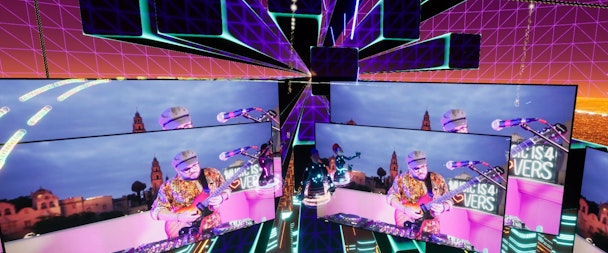Soundscape VR welcomes Evanescence & Griz into its VR-based music experience line-up
Imagine a world in which you can slip on a virtual reality (VR) headset and meet your friends at a virtual concert. Now imagine that world being brought into existence not in some remote future, but within the next few years. Welcome to music in the metaverse – a reality that’s inching closer by the day.

Memo Rex performing in VR
Soundscape VR recently announced that it has added a roster of new artists – including the multi-platinum-selling band Evanescence, electronic artist Griz and jam band Umphrey’s McGee – to Magic Mirror, its VR-based music platform. Though the arrival of a fully-fledged metaverse is still years away, VR is already showing great promise in its potential to increase accessibility to events for fans, while also minimizing stress for artists.
Magic Mirror is a platform that transforms 2D music content – such as music videos, concert footage or livestreamed performances – into immersive, 3D experiences via VR software. Fans can enter a variety of virtual landscapes in Magic Mirror and watch performances from some of their favorite artists in a number of otherworldly settings (underneath an array of giant, rotating screens, say, or at the foot of a digital mountain, upon which a performance is being projected) while also ‘taking part in activities ranging from painting and virtual art collaboration, to flying, exploration, playing games and more.’ The platform also provides artists with an entirely new virtual medium through which they can engage with their audience.
Ben Ferguson, director of operations and marketing at Soundscape VR, says that a key principle underlying his vision for the future of music is accessibility. “Think about it – what’s the cost to go to Bonnaroo? On a bare-bones budget, you could be out of $1,000 to $2,000. That’s a big chunk of change, and suddenly that music festival event becomes that one tangible thing that you can afford to do.
“And so we thought: ‘What’s next for music?’ We’ve really thought for a long time that it was going to be in virtual reality, which allows for accessibility. Anyone around the world that has access to a headset can open up an entirely new world of entertainment.”
The increased accessibility afforded by VR can also be enjoyed by artists, Ferguson says. Physical tours, he points out, can be enormously stressful, expensive and time-consuming. Hosting a concert in the metaverse, on the other hand, can be done from the comfort of one’s own home studio. “Tools are now being developed that are going to allow people to put on a concert – a fun concert, not just something that’s in front of their iPhone with a guitar that’s streamed to YouTube, but an actual experience – without having to worry about all of those costs.”
The new paradigm of music in the metaverse has the chance to change the traditional dynamic between artists, advertisers and fans. In contrast to in-person music festivals where artists have little control over the sorts of ads that they’re performing next to, Ferguson says that artists performing in the metaverse are likely to have “a flexibility and an opportunity to exercise some constraints that maybe they didn’t have before.” For example, “maybe they don’t want a giant Budweiser sign hanging behind the stage. In VR, everything’s a possibility ... it really comes down to whatever you want to program.”
Though Soundscape VR does not currently allow any ads, Ferguson says that won’t be the case for all platforms, which will lead to a variety of different ad experiences. You might walk into a virtual room, he says, and “be bombarded with thousands of advertisements that have been highly targeted to you.”
Though VR-based music experiences are likely to proliferate over the next few years, it’s unlikely that they’ll fully replace in-person concerts any time soon. The point is to develop an alternative space where artists can engage with their audiences without either party having to pay an exorbitant sum of money or travel great distances – two factors that have become especially salient for many people in the age of Covid-19.
“It’s going to be a hybrid – people will still be attending live shows, but [virtual shows] are going to be an addition to what’s happening now in the music scene, especially with the pandemic,” says Memo Rex, an electronic music producer whose content was just added to the Magic Mirror platform. “A lot of people do want to stay home and do want to quarantine when they can. So if you’re sick or you can’t make it to the show, boom, you’ve got your VR and you’re ready to do it. VR is going to definitely take over popular culture very soon. The metaverse is here to stay, and as an artist I definitely want to be a part of it and its evolution.”

